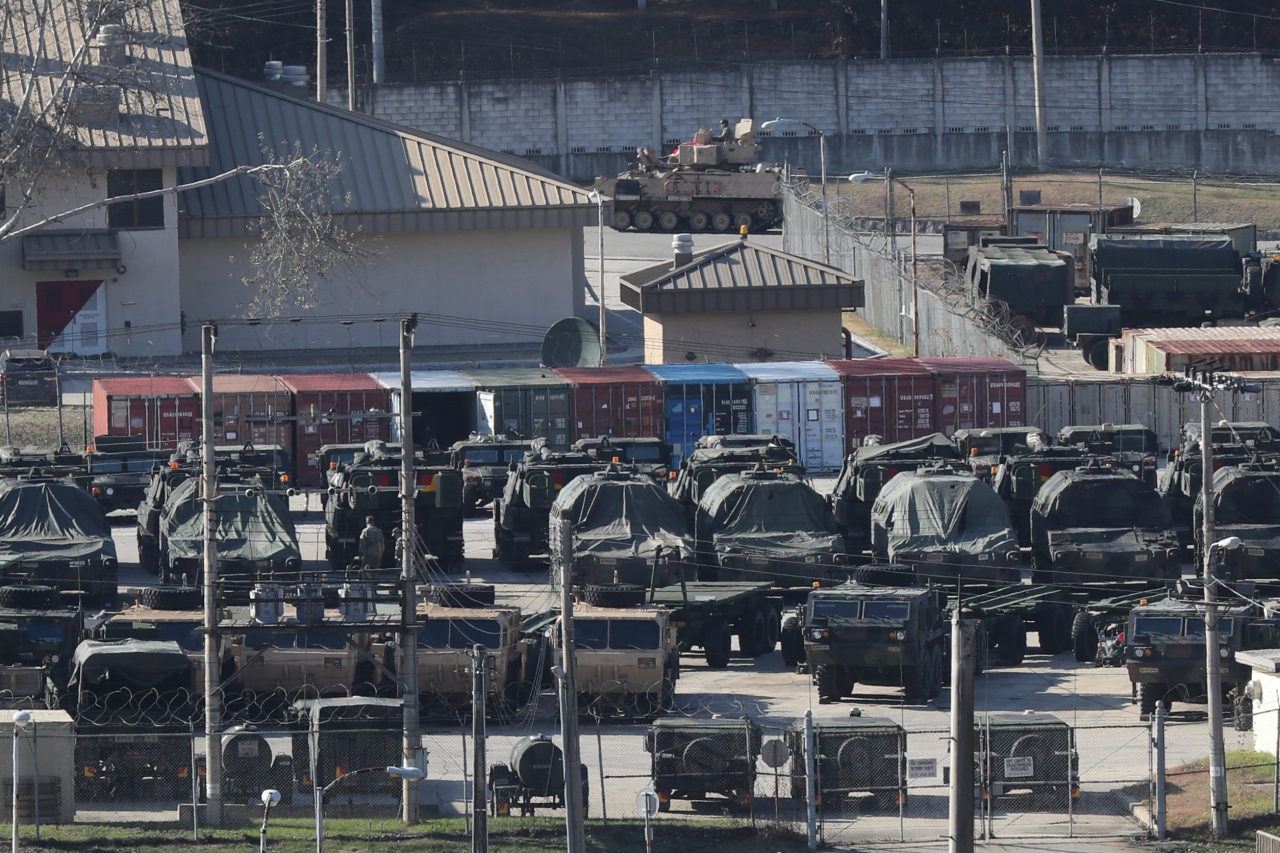Lawmakers criticize US negotiation tactic, calling it diplomatic discourtesy
By Park Han-naPublished : Nov. 20, 2019 - 16:27
US Ambassador Harry Harris and his negotiation team for a defense cost-sharing deal have come under fire for what lawmakers here called “diplomatic discourtesy” as they continue to demand that South Korea pay more for the upkeep of US troops stationed here.
The US team, led by James DeHart of the State Department, left the negotiation table earlier than planned Tuesday, the second day of talks in Seoul with the South Korean delegation for the 11th Special Measures Agreement, the two sides’ defense cost-sharing accord. They initially planned to have a seven-hour meeting but the meeting only lasted 90 minutes.
The US team, led by James DeHart of the State Department, left the negotiation table earlier than planned Tuesday, the second day of talks in Seoul with the South Korean delegation for the 11th Special Measures Agreement, the two sides’ defense cost-sharing accord. They initially planned to have a seven-hour meeting but the meeting only lasted 90 minutes.

As the talks involve hundreds of millions of taxpayer dollars and the South Korea-US alliance, talks in past years have been tough and the parties took as long as a year to reach an agreement. Cutting a meeting short was an unprecedented move by the US, according to a Foreign Ministry official.
Shortly after the meeting, DeHart held a press conference with selected reporters and demanded the South Korean team put forward a new proposal for “fair and equitable burden sharing.”
The US seems to have employed a “brinkmanship tactic” in an attempt to wrestle additional concessions from South Korea, which was “inappropriate and disrespectful,” said Rep. Ahn Gyu-back of the ruling Democratic Party and head of the National Assembly Defense Committee, in an interview with a local radio program.
“(The US) seems to have written a basic scenario and script before the talks, and I think the media were notified of the press conference within 10 minutes of the negotiations,” he said.
The US has pushed for South Korea to pay around $5 billion next year -- five times the $924 million that Seoul agreed to shoulder this year -- adding new categories, which reportedly include the costs of joint military exercises and rotational forces for US Forces Korea.
“It seems that US President Donald Trump has dropped a $5 billion bill (for South Korea to pay) and forced the US administration to fill in the details,” Ahn said.
The US negotiation strategy appears to be motivated by the fact that the results could influence similar talks between the US and other allies such as Japan, he said.
The US has been exerting pressure on South Korean lawmakers, in no uncertain terms, to contribute more for defense.
Rep. Lee Hye-hoon of the minor opposition Bareunmirae Party and chief of the parliamentary intelligence committee, said Tuesday that she was embarrassed when Harris bluntly demanded multiple times that South Korea should pay $5 billion when she was invited to his residence Nov. 7.
During the 30-minute one-on-one meeting, Harris got straight to the point. “He repeated (himself) about 20 times to ask for $5 billion in defense contributions,” Lee said.
“Harris insisted that South Korea had spent only one-fifth of the amount it should have paid for a long time … it seemed to be the official stance of the US government.”
Calling the US suggestion that South Korea should cover the entire cost of the USFK presence “excessive and unfair,” Lee argued the US also benefits from it, saying it gains early-warning capabilities that would allow it to detect intercontinental ballistic missile threats from North Korea.
“We should also consider that there is a lot of money (that South Korea pays) directly or indirectly, such as exempting various taxes and giving land and buildings.”
According to 2015 data from the Korea Institute for Defense Analysis, the South Korean government has spent a total of 3.4 trillion won a year to indirectly subsidize the cost of stationing USFK in South Korea.
Meanwhile, the floor leaders of South Korea’s political parties headed to the US on Wednesday to deliver the parliament’s bipartisan stance on the defense cost-sharing deal.
During the five-day trip, ruling Democratic Party Floor Leader Lee In-young and his opposition counterparts, Na Kyung-won of the main opposition Liberty Korea Party and Oh Shin-hwan from the Bareunmirae Party, will hold meetings with key figures in the US Congress and the Trump administration.
“The South Korea-US alliance cannot be converted into economic benefits or costs, and we will convey public concern that excessive US demands should not cause divisions and conflicts in the alliance,” Oh said.
By Park Han-na (hnpark@heraldcorp.com)







![[Graphic News] More Koreans say they plan long-distance trips this year](http://res.heraldm.com/phpwas/restmb_idxmake.php?idx=644&simg=/content/image/2024/04/17/20240417050828_0.gif&u=)
![[KH Explains] Hyundai's full hybrid edge to pay off amid slow transition to pure EVs](http://res.heraldm.com/phpwas/restmb_idxmake.php?idx=644&simg=/content/image/2024/04/18/20240418050645_0.jpg&u=20240419100350)






![[From the Scene] Monks, Buddhists hail return of remains of Buddhas](http://res.heraldm.com/phpwas/restmb_idxmake.php?idx=652&simg=/content/image/2024/04/19/20240419050617_0.jpg&u=20240419175937)

![[KH Explains] Hyundai's full hybrid edge to pay off amid slow transition to pure EVs](http://res.heraldm.com/phpwas/restmb_idxmake.php?idx=652&simg=/content/image/2024/04/18/20240418050645_0.jpg&u=20240419100350)

![[Today’s K-pop] Illit drops debut single remix](http://res.heraldm.com/phpwas/restmb_idxmake.php?idx=642&simg=/content/image/2024/04/19/20240419050612_0.jpg&u=)